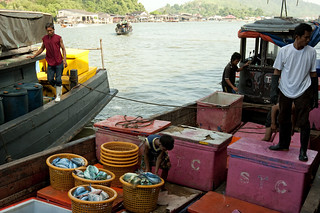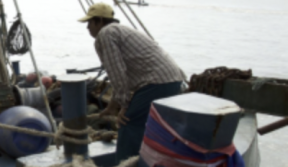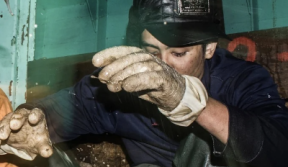There are an estimated 3 million foreign migrant workers in Thailand, over 80% originating from Myanmar. Since the late 1980s, these workers have irregularly crossed borders to work in mostly dirty, dangerous and demanding jobs in Thailand thereby significantly contributing to Thailand’s economy and providing billions of dollars in remittances to support relatives in origin countries. These workers continue to face significant exploitation and confusing piecemeal government migration policies.
In 2002/3, after decades of neglect on developing a systematic migration policy in Thailand the Myanmar, Cambodia and Laos PDR governments all separately signed memorandum of understanding (MoU) with Thailand on regularisation of the status for millions of irregular migrants in Thailand. On 15th July 2009, migrants from Myanmar began to undergo a nationality verification (NV) process.
 Following NV, workers from Myanmar are issued: (a) a 3-year temporary Myanmar passport for use between Thailand and Myanmar, extended to 6-years validity in 2011; (b) a 2-year Thai visa, renewable for 2 years only; and (c) they can then apply for work permits. Since 2010, 70, 000 workers from Myanmar also have entered into Thailand regularly through the MoU import channels.
Following NV, workers from Myanmar are issued: (a) a 3-year temporary Myanmar passport for use between Thailand and Myanmar, extended to 6-years validity in 2011; (b) a 2-year Thai visa, renewable for 2 years only; and (c) they can then apply for work permits. Since 2010, 70, 000 workers from Myanmar also have entered into Thailand regularly through the MoU import channels.
Despite significant and ongoing challenges in NV and MoU processes including exorbitant broker fees and confusing application processes and costs, Myanmar has successfully issued over 1.7 million passports to migrants in Thailand. Thai statistics show however only around 750, 000 Myanmar workers with passports have applied for Thai work permits. More concerning, only around 200,000 Myanmar workers with passports are registered for social security and eligible for health protection.
According to the 2003 MoU signed between Thailand and Myanmar, after migrants from Myanmar have remained in Thailand for 4 years they must return home for 3 years before becoming eligible to return to Thailand. This policy has never been realistic both for workers, employers and Thai and Myanmar governments and their respective economies. Workers need to remain in Thailand to support their families in Myanmar; employers don’t want to lose their trained workers at times of labour shortage; and Myanmar is not ready to receive back migrants to develop its opening economy.
Recently, reports emerged of migrants being required to return to Myanmar for 1 day, 1 month or even 1 year following completion of 4 years in Thailand if they were to be able to return to work legally. But there has been no policy clarity or official announcement. At this time, hundreds of thousands of Myanmar workers passed the 4 year limit to work in Thailand and cannot renew their visas any longer.
As a result of this policy confusion, migrant workers from Myanmar are now facing significant challenges in Thailand. These workers are being tricked, exploited and extorted by Thai and Myanmar brokers, agencies and officials through misinformation about visa extensions or the need to return home and enter Thailand through expensive unregulated systems. Significant numbers of migrants have paid up to 15, 000 Baht (US$500) for new passports, often with new names, thereby forfeiting previously earned social security and labour protection rights and falling into situations of fresh debt bondage and passport confiscation. Other workers and employers are using fake documents, discarding passports altogether and becoming irregular, thereby defeating the success of past regularisation.
The State Enterprise Workers’ Relations Confederation of Thailand (SERC), the Thai Labour Solidarity Committee (TLSC), the Migrant Worker Rights Network (MWRN) and the Human Rights and Development Foundation (HRDF) are deeply concerned about this lack of clarity in migration policy. We therefore would like to urgently ask Thail and Myanmar governments to clarify policy and practice on these following requests:
- The Thai Government should provide opportunities and clarity for migrant workers to access to social security and health protection.
- The Thai Government should clarify concrete migration policy and practice on migration for those who have passed NV process, migrant workers who have entered into Thailand through MOU and workers who have already passed 4 years regulation.
- The Thai and Myanmar Governments should conscientiously enter to punish brokers in order to protect migrant workers from being exploited.
- The Thai and Myanmar Governments should announce policy clarity on migration to all stakeholders.


